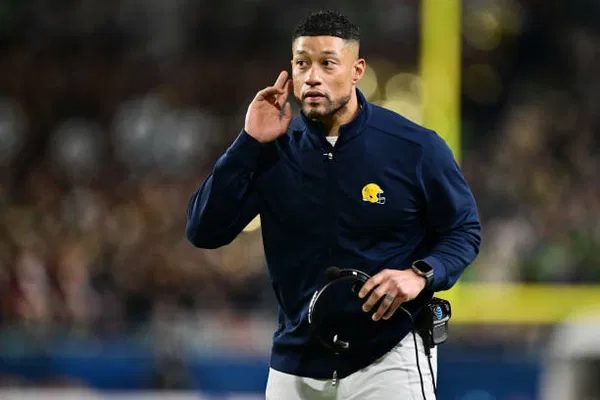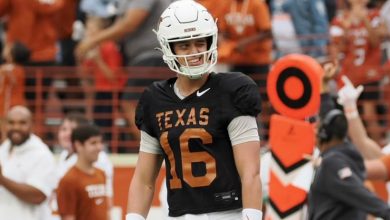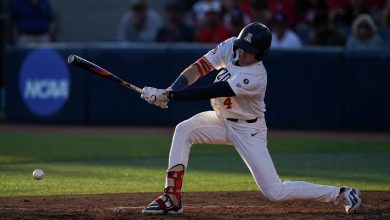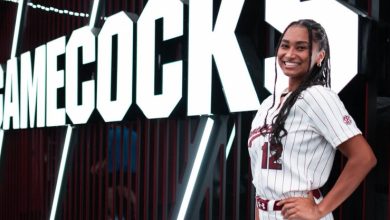For Notre Dame and Marcus Freeman, writing a different ending is the final step

For Notre Dame and Marcus Freeman, Writing a Different Ending is the Final Step
The University of Notre Dame has long been one of the most storied programs in college football history. With its rich tradition, passionate fan base, and long list of accolades, Notre Dame has established itself as one of the powerhouses of the sport. Yet, despite the school’s remarkable history, recent seasons have seen the Fighting Irish fall short of the ultimate prize—the College Football Playoff (CFP) National Championship. In the midst of this struggle for the program’s highest aspirations, Marcus Freeman has stepped into the role of head coach with the hope of writing a different ending to Notre Dame’s championship pursuits.
For Marcus Freeman, the task is clear: to build on the foundation of success that Notre Dame has maintained over the years and to elevate the program to new heights by ending the championship drought. Notre Dame has reached the pinnacle of college football before, but in recent years, it has consistently come up short. The Irish have contended but have not been able to secure the coveted national championship, something that has eluded them since their last title in 1988. With Freeman, a former Notre Dame player and defensive coordinator, taking the reins as head coach, the question remains: can he lead the Irish back to the promised land?
This journey is about more than simply winning games. It’s about returning Notre Dame to its rightful place as one of the premier programs in college football and overcoming the challenges that have kept the team from reaching its full potential in the playoff era. For Freeman, the challenge goes beyond strategic X’s and O’s; it involves forging a culture of excellence, instilling discipline, and ultimately finishing what Notre Dame has started: a championship.
The Tradition of Notre Dame Football
To understand the magnitude of Marcus Freeman’s challenge, it is essential to first look at the rich tradition that defines Notre Dame football. The Fighting Irish have a history of excellence that dates back over a century. With 11 national championships (the second-most in college football history), Notre Dame has produced numerous legendary coaches and players. Names like Knute Rockne, Frank Leahy, Ara Parseghian, Lou Holtz, and Brian Kelly are woven into the fabric of Notre Dame’s history. Rockne, one of the most iconic figures in the sport, led the Irish to their first national championship in 1924 and developed the program’s winning culture, emphasizing the importance of teamwork and discipline.
Throughout the years, Notre Dame has remained a national contender, with several championship appearances, particularly in the 1980s under coach Lou Holtz. The Irish’s last national championship came in 1988, when they finished undefeated and defeated West Virginia in the Fiesta Bowl. Since then, however, Notre Dame has experienced several near-misses, but the championship has continued to elude them. Despite making the College Football Playoff in recent seasons, they have not been able to break through and capture the national title.
The storied tradition of Notre Dame football comes with an immense amount of pressure. Every season, the Irish are expected to contend for a national title, and anything less than that is often seen as a failure. The high expectations can be daunting, but for a program with so much history and prestige, this is the standard. The road to returning to the College Football Playoff and winning a national title will require more than just good recruiting, a sound strategy, and a solid game plan—it will require a shift in mindset and culture.
Marcus Freeman’s Arrival: The New Era
Marcus Freeman’s arrival as head coach in 2021 signaled the beginning of a new era for Notre Dame football. Freeman, who had been hired as Notre Dame’s defensive coordinator in 2021 after a successful tenure at Cincinnati, was elevated to the top job following the departure of longtime head coach Brian Kelly to LSU. Freeman’s quick rise to the head coaching position was notable not only because of his coaching acumen but also because of the immense respect he had already garnered within the program and across the college football landscape.
A former Notre Dame linebacker, Freeman was already well-acquainted with the program’s culture and the expectations that came with it. His familiarity with the ins and outs of Notre Dame gave him an advantage as he stepped into the leadership role. Freeman had the distinct opportunity to bring a fresh perspective while staying true to the principles and tradition that had been at the core of the program for so many years.
However, Freeman’s challenge was not just about continuing Notre Dame’s legacy—it was about evolving the program to contend in the modern college football landscape, where new dynamics like the College Football Playoff, NIL deals, and the transfer portal have changed the game in ways that even the most prestigious programs must adapt to. Freeman needed to bring his own vision, style, and leadership qualities to the forefront, while also recognizing the significance of the culture that had been built over the decades.
The Formula for Success: Bringing Back Consistency
To return Notre Dame to championship contention, Freeman understood that it would take more than simply winning a few key games. The formula for success required several key factors: recruiting at an elite level, maintaining a high level of consistency, developing leadership on and off the field, and winning the games that matter the most.
First and foremost, Freeman knew that Notre Dame’s success would begin with recruiting. While the Irish had been competitive in recent years, particularly under Brian Kelly, Freeman recognized that to build a team capable of winning the national championship, the program needed to recruit elite talent—especially at key positions. Notre Dame had always prided itself on its academic and athletic excellence, and Freeman had to ensure that the team continued to recruit top-tier student-athletes who could both meet the rigorous academic standards of the university and excel on the football field.
Freeman and his staff’s ability to close strong recruiting classes would be critical. While Notre Dame had never been a team that relied on star-studded, flashy recruits, Freeman knew that to compete with programs like Alabama, Georgia, and Clemson, the Irish needed to secure high-quality prospects at key positions such as quarterback, defensive line, and wide receiver. In his first year as head coach, Freeman was tasked with keeping the momentum going in the recruiting department while also ensuring that the incoming players could adapt to the unique challenges of playing at Notre Dame.
Along with recruiting, Freeman needed to foster consistency—something that had eluded the Irish in recent years. Even as Notre Dame had consistently been competitive, it had often faltered in crucial moments. Whether it was losing a close game to a top-ranked opponent or failing to perform in the postseason, the Irish had a tendency to come up short when it counted most. In college football’s playoff era, this inconsistency had kept the team from reaching the highest echelon.
For Freeman, this meant developing a team that could execute on all fronts: offense, defense, and special teams. Notre Dame needed to build a complete team capable of winning any type of game. This included making adjustments to the offensive scheme to match the evolving style of play in college football, enhancing the defense to match up with elite offenses, and ensuring that the special teams unit was both efficient and reliable.
The 2022 Season: A Glimpse of Hope
Freeman’s first season as head coach was a mix of highs and lows. After a tough start that saw Notre Dame lose to Ohio State and Marshall, the Irish found a rhythm as the season progressed, finishing strong with a bowl win over South Carolina in the Gator Bowl. While the 2022 season was not as successful as Freeman and the Notre Dame fanbase had hoped for, it provided important lessons and insights into where the program stood.
The Notre Dame defense under Freeman showed promise, particularly with standout players such as linebacker Jack Kiser and defensive lineman Isaiah Foskey. The offense, led by quarterback Drew Pyne, began to find its footing after early struggles, although it was clear that the Irish still had work to do to find consistency at the quarterback position. Freeman’s coaching ability was evident, but the team’s inconsistency highlighted the need for continued development, especially with a young team.
The season was also a reminder that in the competitive landscape of college football, the difference between a playoff contender and a team on the outside looking in is often small but significant. Notre Dame’s challenges in 2022 were not insurmountable, but they underscored the need for steady growth, better execution, and more depth, especially at the skill positions.
The Path Forward: Writing a Different Ending
For Marcus Freeman and Notre Dame, the task is clear: build upon the foundation established in 2022 and take the next step toward national championship contention. This will not happen overnight, but with Freeman at the helm, the program has the right leadership to make it happen.
Writing a different ending means improving the areas where the team has faltered in recent years. It means continuing to recruit elite talent, refining the team’s execution in critical moments, and developing the mental toughness needed to handle the pressures of high-stakes games. It also means learning from the mistakes of the past, and not allowing those shortcomings to define the future.
Freeman’s ability to keep Notre Dame focused on the bigger picture—maintaining the tradition of excellence while adapting to the modern landscape of college football—will be the key to the program’s success. The Irish are close, but they are not yet there. However, with Freeman’s leadership, a talented roster, and an unwavering commitment to the program’s storied legacy, Notre Dame is well-positioned to rewrite its ending and finally return to the top of college football.









